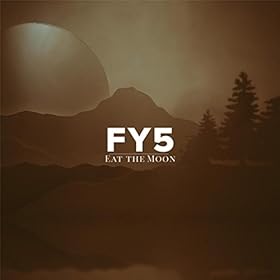|
FY5, Eat the Moon (Swingfingers, 2015) Trinity River Band, Heartstrings (Orange Blossom, 2015)
Also, as I noted last time around, the proximate influence behind this approach to 21st-century bluegrass is Alison Krauss. Perhaps Bill Monroe, originally an innovator, latterly a musical conservative, would not recognize what's going on here as bluegrass, with the exception of the excellent "Blue Mandolin," which the Harrises, perhaps to demonstrate that they can do it when they want to, treat as an exercise in the un-hyphenated genre. Bluegrass was defined not just by instruments but by its downhome accents. In common with other current bands, notwithstanding "Mandolin" and the occasional country touch, TRB does not pretend to be a product of the Appalachian South. Which is all right. The Harrises are singing the music their way and doing it in fine style. Either you respond to their approach or you don't, but even if it lacks the rough and rowdy ways of the old music, nobody can complain it doesn't make for an accomplished, up-to-date vision of melodic acoustic music. Still, my favorite cut is "Where Are You," which though from across the Atlantic falls easily into a TRB arrangement. I suppose, however, that there's little prospect of an entire album's worth of Irish music in the future. Incidentally, while characterized in the notes as a "traditional Irish ballad," "Where Are You" is not actually a ballad, i.e., a narrative account of an event. Technically, it's a lyric folk song. In any event, TRB's rendition is a pleasure.
The "FY" represents the last names of band members Mike Finders (guitar, lead vocals) and Aaron (banjo, pedal steel) & Erin (upright bass, lead vocals) Youngberg. The "5" counts the size of the band, which besides the just-mentioned includes Ryan Drickey (fiddle, viola) and Rich Zimmerman (mandolin). The songs are all originals, written by either Finders or Erin Youngberg, and they're mostly pretty good. Two or three are better than that, such as Finders's deceptively cheerful break-up tune "After Tonight" and Youngberg's light-handed but affecting "The Day is Wide Open." Aside from the sure-handed singing and picking, what I like most about FY5 is its lyrical ambition. Yes, there are relationship songs -- aren't there always, everywhere? -- but the dark "Saint Vrain," ambitious enough to attain the resonance of an epic, recalls the devastating floods that swept Lyons, Colorado, in 2013. Natural disasters used to be a common ballad subject, and FY5's contribution to that tradition reminds one of the power both of nature and of memory encoded in music. 
|
 Rambles.NET music review by Jerome Clark 1 Aug. 2015 Agree? Disagree? Send us your opinions!  Click on a cover image to make a selection. 



 |


